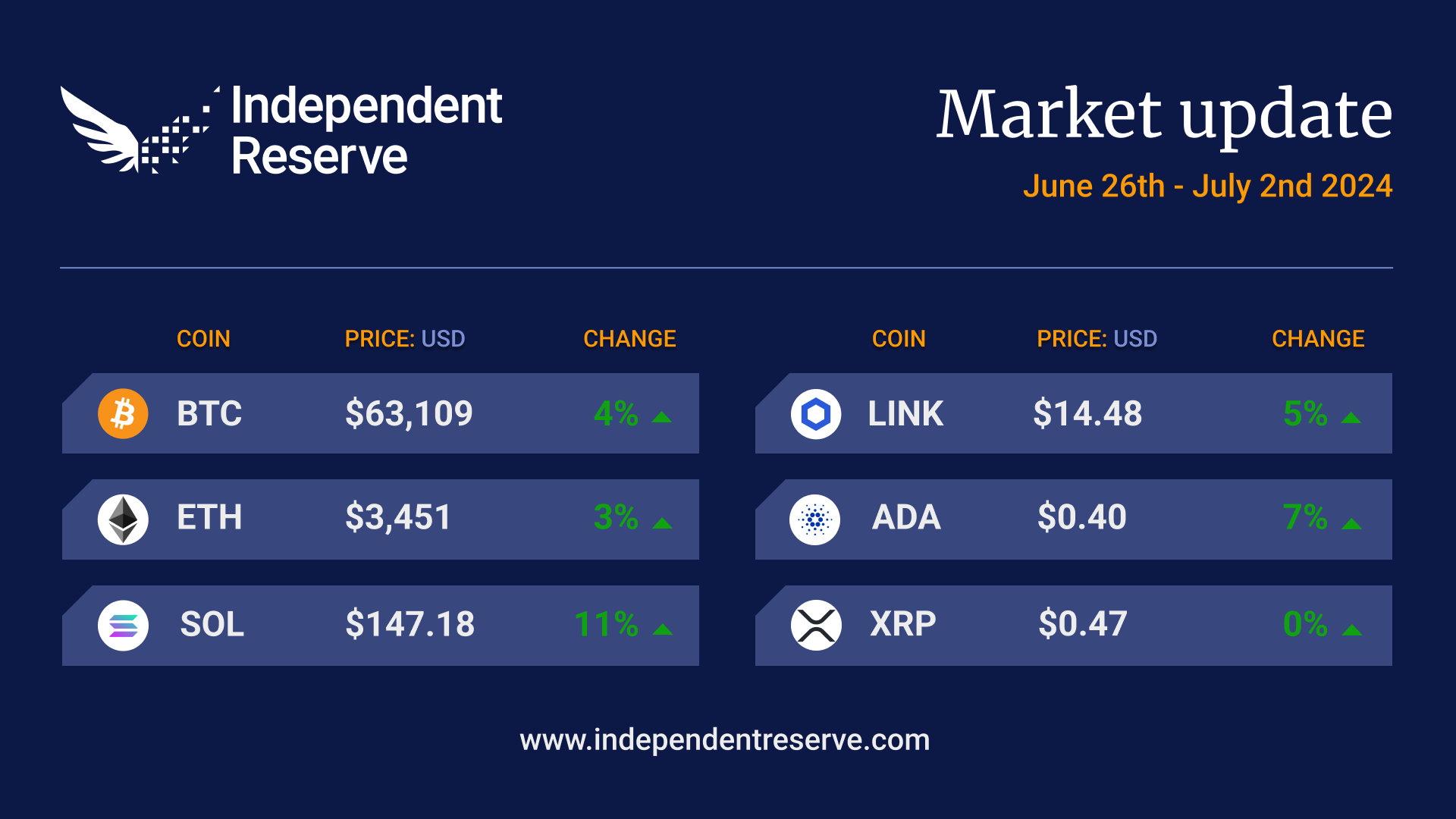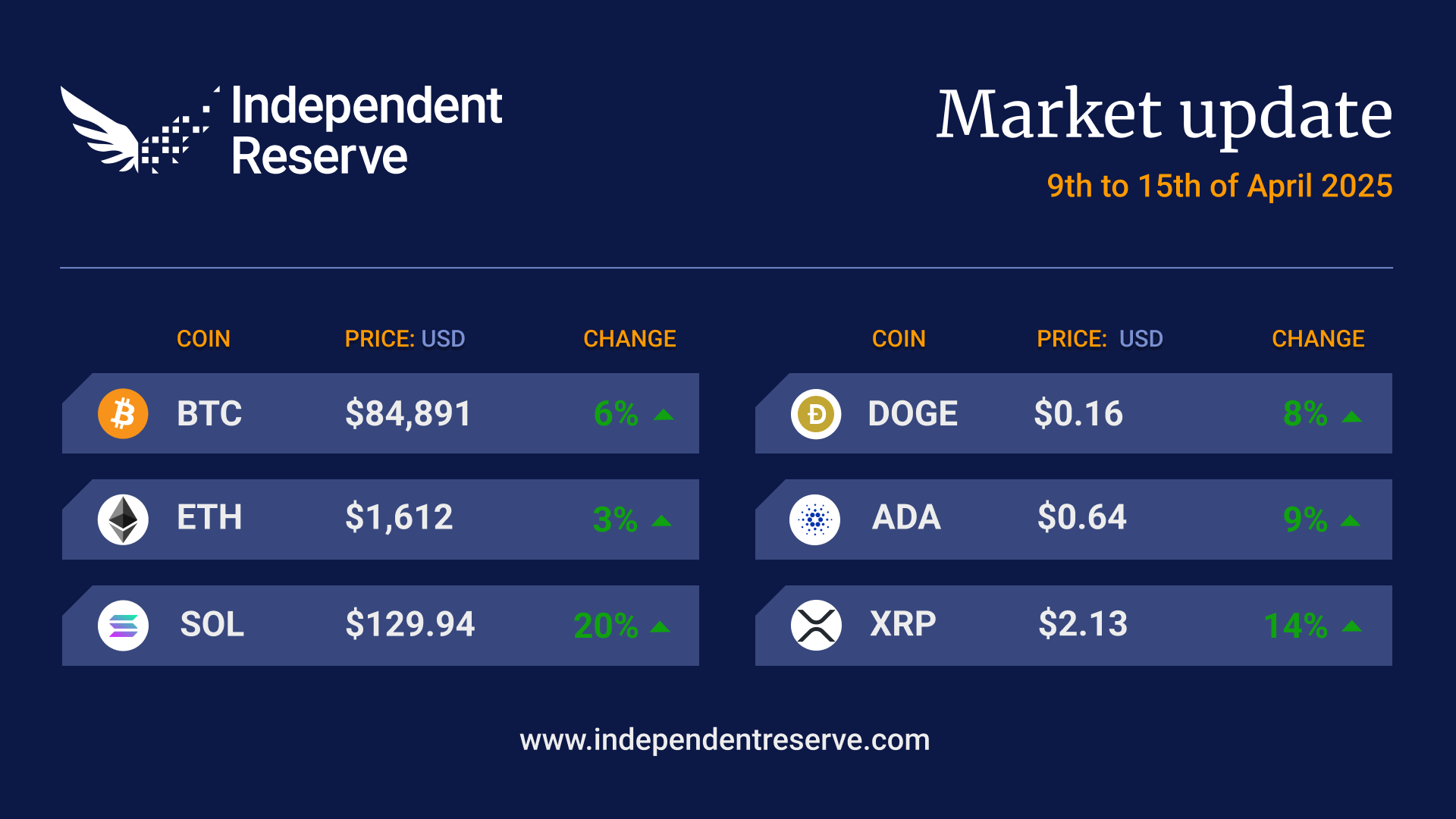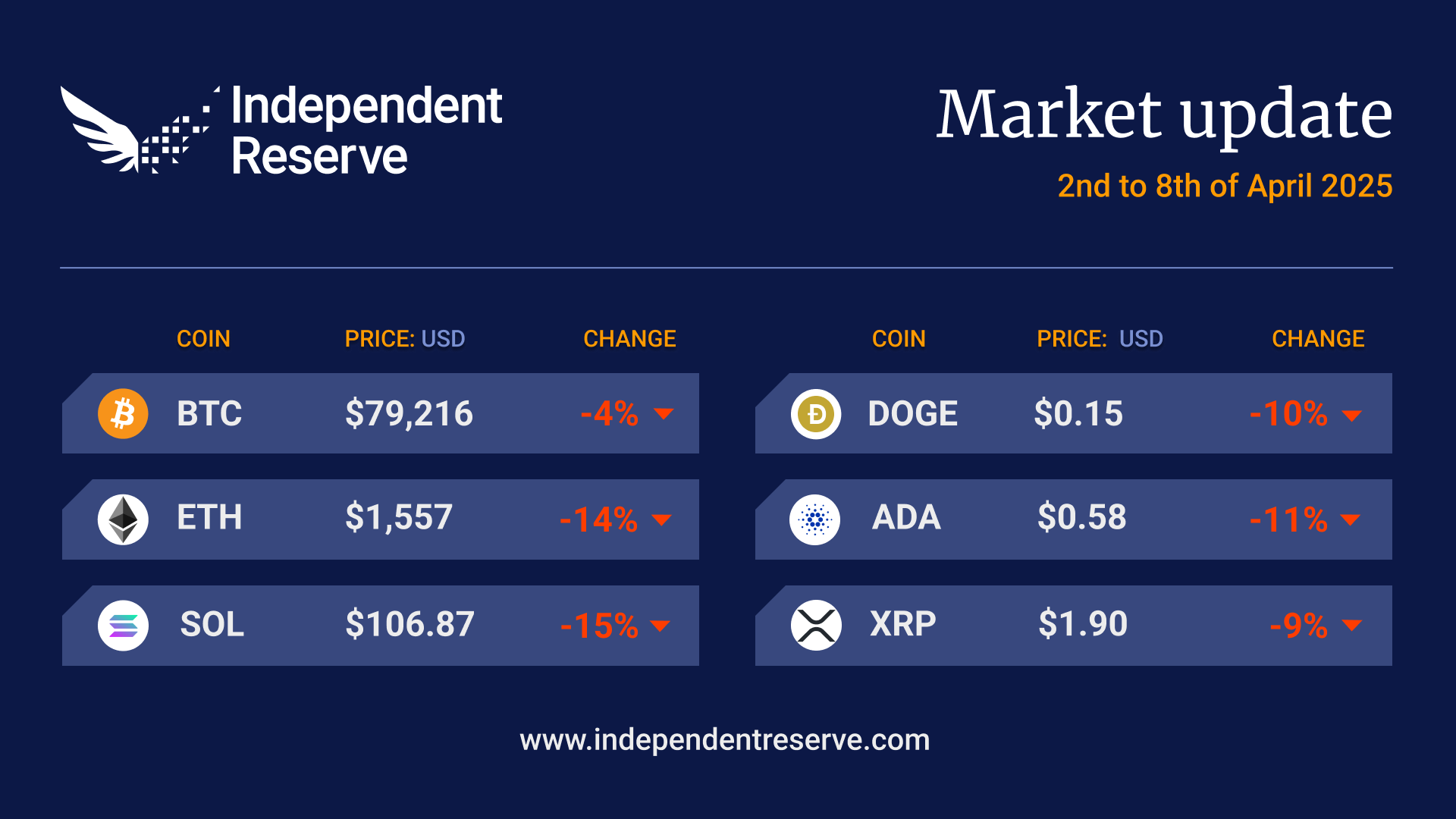In Markets
After dropping below A$89K (US$59K) in the wake of the Mt Gox repayments news, Bitcoin has recently staged a recovery and the price jumped 4% a day or so ago. BTC is currently trading at A$94,354 (US$63.1K) which puts it 4% up on the same time last week. Ethereum is trading around A$5,160 (US$3,451) which is 3% up on the same time last week. Solana led the altcoin gains with an 11% rise thanks to speculation over a potential ETF, XRP gained 0.15%, Dogecoin (3.5%), Cardano (7%) and Shiba Inu (7%). The US Bitcoin ETFs ended June in the black, with a net A$1.03 billion (US$688 million) of inflows. However, the final week of June saw around A$56M (US$37.3M) in outflows. Historically July is a positive month for crypto markets with an average gain of 7.42%. The Crypto Fear and Greed Index is at 53, or Neutral.

In Headlines
New token listing: TRON (TRX) now available for trading
Tron (TRX) is now available to trade on Independent Reserve. TRON is a blockchain-based decentralised platform that aims to build a free, global digital content entertainment system with distributed storage technology, allowing easy and cost-effective sharing of digital content. Founded by Justin Sun in 2017, TRON focuses on decentralising the internet and enabling developers to create smart contracts and decentralised applications (dApps). Its native cryptocurrency, TRX, is used within the TRON ecosystem for transactions and as a means of value exchange, facilitating various operations on the network. The TRON network is known for its high throughput and scalability, making it a popular choice for dApp developers and users.
Reasons to be cheerful
It’s possible that traders are starting to realise the Mt Gox repayment news isn’t as crippling as first believed. The defunct exchange’s US$8.5 billion (A$12.7B) in Bitcoin will certainly affect price but is insignificant compared to the US$1.25 trillion (A$1.86T) Bitcoin’s total market cap. Galaxy Research analyst Alex Thorn believes that only about 64,000 of the total 142,000 Bitcoin will be distributed to individual creditors, most of whom are long time HODLers who have resisted selling their claims for years and are therefore unlikely to sell now. In some related good news, FTX creditors will receive around US$15 billion (A$22.5B) in cash in October – and those traders are quite likely to tip those funds back into the market.
Secondary sales: Still not securities
US Federal Judge Amy Berman Jackson has allowed most of the SEC’s lawsuit against Binance over charges related to the BNB ICO, staking and fraud to proceed. However, in a notable win for the crypto industry, the judge granted a motion to dismiss charges tied to secondary BNB sales and the Simple Earn product. Jackson cited and reaffirmed the ruling in the 2023 Ripple/XRP case, stating that the token itself is not a security for secondary sales even if it fell under security laws in the initial sale.
Consensys sued
As promised, the SEC is suing Ethereum infrastructure provider Consensys alleging that Metamask Swaps and Staking violate securities laws. Metamask is the most popular ETH wallet and the SEC alleges that at least 5 million of the 36 million swaps over the past four years related to “crypto assets securities” such as Polygon (MATIC), MANA and SAND. The regulator also took aim at DeFi projects Lido and Rocket Pool (which Metamask uses for staking) and claims that liquid staking tokens stETH and rETH are securities. Consensys called it “regulatory overreach” and an attempt to “expand the SEC’s jurisdiction via lawsuit.”
Chevron doctrine overturned
A new judgement calls into question the SEC’s ability to just make up its own rules by interpreting legislation. Back in the 1980s the Supreme Court’s Chevron doctrine gave regulators a lot of freedom to interpret sometimes ambiguous laws they are responsible for implementing, with courts bound to give weight to that interpretation. The idea was that the regulators are experts and should be able to enforce rules while legislators dither. But the new Trump-appointed majority on the court overturned that precedent calling it “unworkable” and claiming it “allows agencies to change course even when Congress has given them no power to do so.” The ruling puts the onus on courts to interpret the laws rather than agencies. In a separate case, the court curtailed the SEC’s use of in-house administrative judges to settle civil fraud lawsuits which it says violates the constitutional right to a jury trial.
Solana ETFs filed
VanEck and 21Shares have both taken swings at the fences by filing paperwork to launch Solana ETFs. The chances of approval anytime soon seem slim at this point, given the SEC has named Solana a security in various lawsuits and because the two ETFs approved so far had Futures ETFs trading first enabling the regulator to assess market manipulation issues. Solana also unveiled a new feature called Blinks. Short for Blockchain Links, the feature turns on-chain actions like voting, donating and swapping into a URL link that can be dropped onto Web2 social media platforms.
IRS defers DeFi broker decision
The US Internal Revenue Service has deferred a decision on whether to implement a proposal to make DeFi platforms and “unhosted wallets” play by the same broker rules it is now applying to centralised exchanges like Coinbase and Kraken. The Blockchain Association claims the rules are unworkable for DeFi and would require 8 billion new tax forms to be filed. However, this is not a final position and the regulators may still later decide to implement the proposed changes.
Wen Ethereum ETF?
Speaking of ETFs, it’s July: Where’s that Ethereum ETF we were promised? Decrypt reports that the SEC has returned the S-1s to issuers with only “light comments” and asked them to refile by July 8. Unfortunately, the report says there will still be one more round of filings before the ETFs can start trading. Bitwise chief investment officer Matt Houghan has crunched the numbers on the relative marketcaps of ETH and BTC and estimates the ETFs will be more successful than many expect. “Ethereum ETPs will attract US$15 billion (A$22.5B) in net flows in their first 18 months on the market,” Hougan declared. Galaxy’s Alex Thorn thinks that US$1 billion (A$1.5B) per month will flow into the Ethereum ETFs over the first five months, based on comparisons with existing products.
MICA kicks in
Europe’s new digital assets MICA rules came into partial effect on June 30 with big implications for stablecoins. The new rules kicked off a flurry of delisting with Bitstamp, Uphold and Binance all implementing a variety of new rules about Tether and its Euro stablecoin, as well as Frax, Gemini dollar, Pax dollar and TrueUSD. However, Circle has nabbed itself the first EU stablecoin licence and will be able to issue USDC and EURC in the region.
MAS expands Project Guardian
The Monetary Authority of Singapore has expanded its Project Guardian initiative that aims to accelerate adoption of asset tokenisation. Previously focused on pilot projects with 24 financial institutions, it’s now collaborating with the global industry associations: Global Financial Markets Association (GFMA), International Capital Market Association (ICMA) and the International Swaps and Derivatives Association (ISDA). The project is developing standards across key asset classes as well as shared ledger infrastructure.
Singapore raises risk level for DPT providers in latest terrorism financing assessment
Singapore’s latest Terrorism Financing National Risk Assessment raised the risk level of Digital Payment Token (DPT) service providers from “medium-low” to “medium-high,” citing the anonymity and speed of transactions. The report, updated from 2020, highlights the increasing risk of terrorism financing through digital payments, cross-border transactions, and foreign online crowdfunding. Banks and money remittances remain at “medium-high” and “high” risk, respectively. The assessment underscores the need for stringent know-your-customer processes and international cooperation to combat these risks effectively.


